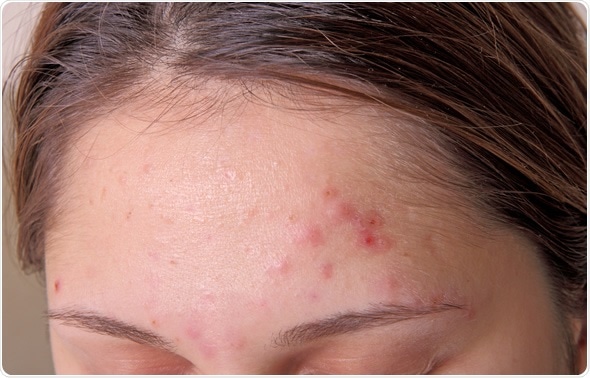Acne is the most common skin disorder, with its highest prevalence in teenage hood and early adult years. It affects 80% of teenagers and adolescents, but is usually mild to moderate in its degree of severity. The physical consequences of acne are mostly minor, but it carries a risk of poor self-esteem and psychological distress which may not be seen as medically significant when considering its impact. Fortunately, these concerns are becoming increasingly recognized today.

Acne on forehead. Image Copyright: TRIG / Shutterstock
Familial Factors
Acne is linked to family history, in fact most individuals with acne have one or more siblings with the condition, and one or both parents have a positive acne history. In addition, research has shown a strong genetic causation. Several studies in twins reported that the level of causation of acne due to genetic variation between individuals was between 50 to 90%.
Genetic Variance
Several genetic models have been explored to find the level of heritability. The ACE model showed that genetic variation was responsible for 81% of the disease variance. Thus environmental factors were responsible for less than 20% of the condition’s phenotype. These include factors such as birth weight, body mass index, height, and present weight. Other features include androgen excess symptoms such as hair loss or balding, and other features of metabolic syndrome or polycystic ovarian syndrome, including the levels of various lipoproteins and of glucose. These findings have stimulated further research to identify the genes responsible, which can, in turn, help to find more effective remedies.
This high level of heritability was linked to a particular gene region in Americans of European origin with severe teenage acne, namely, the SNP rs4133274 on chromosome 8q24. This is upstream of the MYC region which is also responsible for androgen regulation via androgen receptor expression.
Acne and Cancer
A high proportion of patients with severe acne later develop breast or prostate cancer, both of which are androgen-dependent. Research is required to reveal the revealed the most significant association with severe teenage acne.
Treatment Options in Acne
Much current research focuses on the effectiveness and safety of topical and systemic drugs used in acne. Many antibiotics used for acne are becoming redundant because of the development of antibiotic resistance. New drugs and vehicles are thus required to replace older and ineffective ones.
Research on new drugs also serves to elicit their safety, any adverse effects, and the optimum regimen. Various dietary manipulations are also under study to research the effect of chocolate, oils, and other food components on the timing and/or severity of breakouts. Other studies are underway to find out the superiority of various surgical techniques for treating the scars left by acne.
Lifestyle factors such as sleep, stress, and rest are also under the scanner for their effect on acne attacks.
Mechanisms Underlying Acne
Genomic and gene marker studies also attempt to clarify the genetic basis of susceptibility to acne, which may throw light on its prevention and treatment. In addition, it is important to study how sebum overproduction occurs. Another group is trying to identify the mechanisms that underlie the common causative factors in acne, namely, the inflammation of the skin and the immune system triggering by colonization with Propionibacterium acnes.
References
Further Reading
Last Updated: Feb 26, 2019